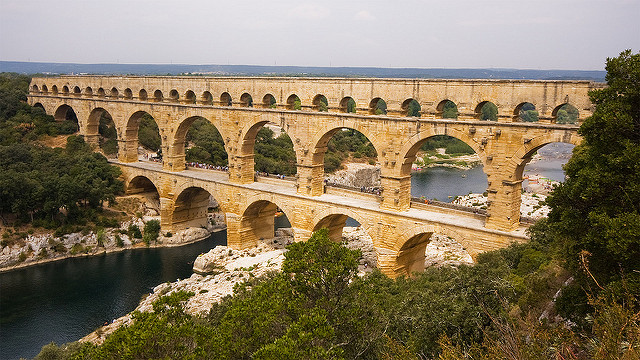First, a heads-up: After a couple of weeks of lighter reading, we’re back to some more serious reading this week. Budget your time accordingly.

The Pont du Gard, an ancient Roman aqueduct that crosses the Gardon River in France. It is part of a 50-kilometer system that delivered spring water to a Roman colony occupying what is now Nîmes. Photo by Arjan Almekinders, and used under a Creative Commons license.
This week we launch into the study of water systems. This is a HUGE topic—one in which we could design not just one course, but an entire major and graduate program. We will, then, be looking only at a few widely dispersed case studies this week before we focus on water systems closer to home in the American West.
When we consider any single water system, we must recognize there are actually several systems at play in its construction:
- Most obviously, there is the physical construction of the water delivery system. Where does it originate? Where does it end? Of what materials is it constructed? When was it first built? How has it been modified? Who maintains it? Who owns it? Who, if anyone, owns the water it transports?
- If the system delivers purified water, what further systems are in place to clean it? Who sets the standards? Who tests the water? Who is responsible for its purity? Who is accountable? Who is most likely to pollute it? Who suffers when it is insufficiently clean? What is the punishment for polluting the water, and is this punishment ever actually applied?
- By what system is the water allocated? Do people pay for the water? Do people who can afford to pay more get more water than those who can’t? Are people encouraged to conserve through marketing measures, peak pricing models, or punitive means? Who determines who owns the water? What parts of this allocation system have been challenged or disputed?
- What legislative or political systems govern the water system? (Some of the bullets above touch on this issue.) Can water purity, amount allocation, or cost be changed by voters or government agencies? If a water system is private, under what legislative rules or political pressures does it operate?
- What additional systems does available water allow to thrive? Is it used in recreational landscapes (a water slide park, whitewater rafting, fishing, etc.)? Does it irrigate crops? If so, whose, and what types? Does it irrigate residential or commercial landscapes? If so, how? How does water affect the hygiene and health of a community?
- Think also of the wastewater system. Where does water go after it has been used in one way or another? Who determines where wastewater goes and how it gets treated?
You may be thinking of other systems required to construct and maintain a water system, or maybe you know of other systems engendered by the availability of water. Please be sure to make note of these, as they’ll come in handy in an assignment in the second half of the course.
Meanwhile, go ahead and move on to Module 8.1.